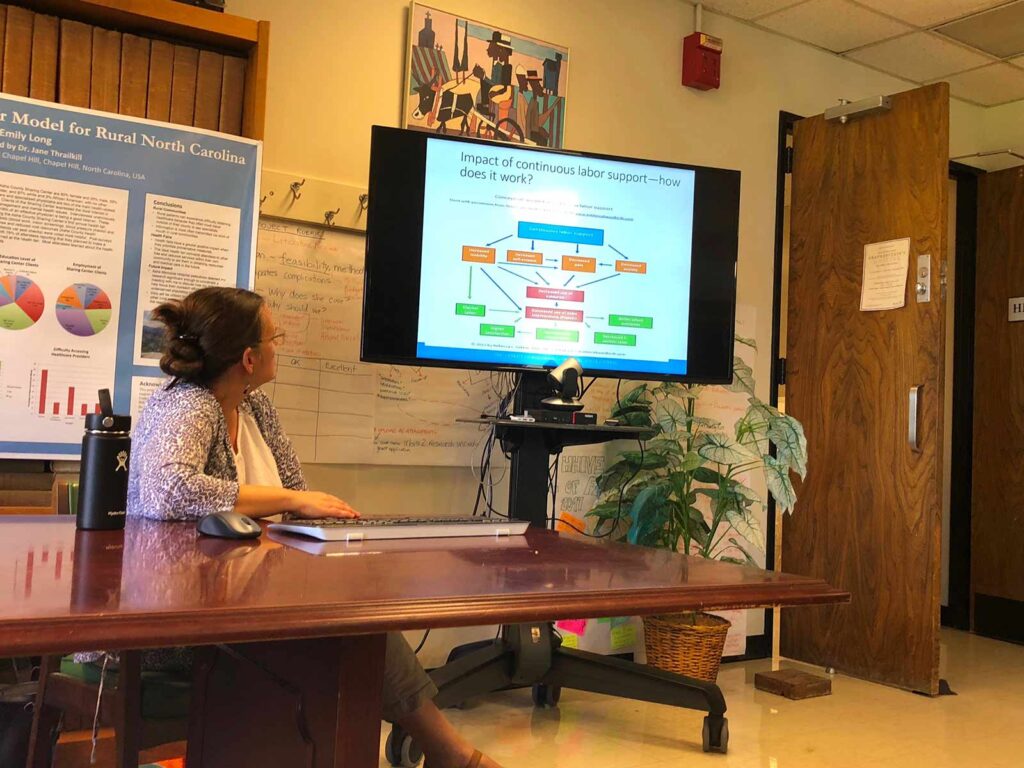
“They may forget your name but they will never forget how you made them feel.”
-Maya Angelou
With these words, the Birth Partners at UNC Medical Center conduct their volunteer doula program which provides complementary birth support to any mother at UNC hospitals. On Wednesday, September 19, Rhonda Lanning presented the program she directs in the HHIVE Lab in an effort to convey the importance of consistent emotional, physical, and educational support to maternal health. As the only industrialized nation with a rising rate of maternal mortality, the United States struggles to improve the experience of childbirth, and many believe that doulas could be the answer.
A doula is a professionally trained birth assistant who is present throughout labor and acts as supportive resource as the mother learns to breastfeed and care for her newborn, and as she recovers from the birth. The importance of having someone there to simply show compassion is often underrated in current healthcare systems more easily measured metrics. Birth Partners trains doulas in client centered care that focuses on birth as a vital life event rather than a medical procedure. Comments such as “I couldn’t have done this without you” are frequent. At UNC, these services are provided for free, an essential aspect since only two states in the US provide insurance reimbursement for doula services. UNC hospitals’ goal is to provide equal access to doula care, regardless of financial means or socioeconomic background. The doulas encourage skin-to-skin contact directly after birth and are able to teach the new mother positioning and cues that may be displayed by their infant that shows they are ready to start feeding.
While Professor Lanning believes the most important aspect of the doula program is its emotional support, she also provided data to reinforce the statistical importance of the program. The maternity crisis in the U.S. consists of the rising rate of maternal mortality, the disparity between outcomes of white mothers versus mothers of color, and elevated rates of postpartum depression in new mothers. According to the Cochrane Review of 2017, the continuous presence of an unrelated individual conclusively improves birth outcomes. Mothers have also been shown to remember how they were treated as a person more so than other aspects of their birth experience when asked about it decades after the birth.
At some point in a person’s life, whether it be as a mother, a partner, a caregiver, or simply being born herself, he or she has interacted with the labor and delivery section of healthcare. The United States has extreme rates of postpartum depression, indicating that one in seven women will experience it after giving birth. It is also the country with the lowest mandated paid maternity leave, at zero weeks. There are inadequate resources and funding allocated the care of mothers nationwide and this is one way that UNC hospitals is attempting to fill the gap. Approximately 10% of births are assisted by a doula at UNC as the program strives for perfect rates of doula provision. The compassion and vigor with which Birth Partners provides its services makes UNC a highly regarded birth location.
To become a doula, interested persons may visit www.uncmedicalcenter.org/doula or email doula@unchealth.unc.edu. There is also a class offered by Professor Lanning in the fall called Supporting the Childbearing Family that trains students to become doulas themselves.
__________________________________________________
Kate Capitano is a sophomore student majoring in Global Studies. Her concentration is Public Health and Environment with Latin America as the area of study. She is also on the pre-med track and hopes to combine the two through the Medicine, Literature, and Culture Minor. Specifically interested in women’s rights and health, Kate hopes of one day becoming an OBGYN.


